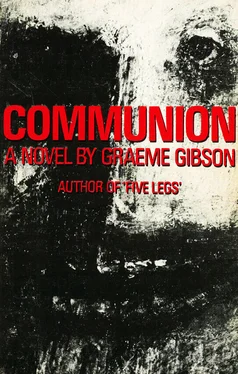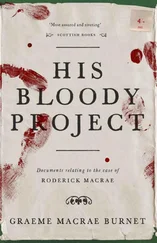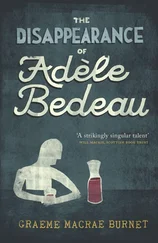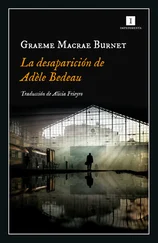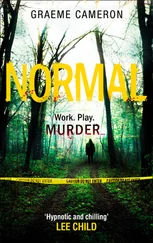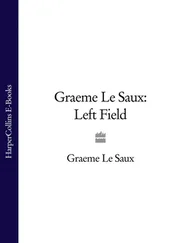As its silence spreads Walters hears a sound unlike the others, a rattling mechanical noise and it’s coming from right beside him. Curious he turns to Felix Oswald, sees the chattering teeth, the eyes, and is suddenly, Oswald! “Oswald” for chrissakes, “Felix are you alright?” Reaching for the arm, touching, feeling the tension and soothing, “What’s the matter Felix?” with his voice and hand, “You’ll be alright, you’ll be . . . ” Felix stares for a moment at Peter Walters and then begins to cry.
He comes to the street and into the sun. It’s two blocks to the subway station, and today there’s no sign of a bus. His long legs carry him unthinking. Automatically he adjusts his stride so that his left foot hits the lines on the sidewalk. He’s particularly anxious to get there and even with his coat open, flapping about his legs, he begins to sweat, it’s because of the effort, the sweater, his winter coat, the sun . . .
When he bursts onto the platform his body is damp. He can feel the heart alive in his chest: he senses vague pains, he reaches under his sweater, inside his shirt so his fingers are in the armpit, his palm across the nipple, and he presses roughly, he digs his fingers into the moist flesh and leans to stare down the track. There’s only an hour for lunch. No sign of the train, not yet. But there are children chasing among themselves: they appear to be spitting at each other; they make exaggerated hawking sounds in their throats, they rush about noisily, bumping into men and women who, in turn, push back at the children, their mouths opening and closing as they reprimand them. Several have left briefcases on the platform now, so they can run about more freely. One little boy, standing by himself, appears to be crying. Felix watches them and sees that they spit like children with the fronts of their mouths, their lips, and their spittle is frothy and inconsequential. There are many travellers waiting, so he hasn’t just missed a train. He finds that reassuring. At the same time in their frenzy the children may not see that briefcase by the edge, one of them, looking back over its shoulder as it flees could very easily trip over it and fall onto the tracks. And the train is coming. It could easily happen. He hears it to his left, but the children don’t. They continue to chase each other, laughing shrilly: one little girl, perhaps because of her long hair, is being pursued by several boys at once; she darts this way and that in her attempts to elude them. The train hurtles into the station, he can see where the spittle gleams in her hair.

Standing by the window perhaps. Vaguely aware of the garages at the end of the garden, the catalpa, the sound of a commuter train on the bridge. Not really. Pretending . . .
Everything dirty, seedy from winter. His hands have no strength. His fingers are trembling. He turns from the window and sees himself reflected in the mirror: he crosses the room to his reflection, he can almost count the hairs in his beard.
On the subway, not sitting, standing in the corner so that he touches no one, nobody can accidentally brush against him with their bodies because of a sudden stop, or even, as can happen, because the cars sway as they rush from station to station.
Davisville, past the cemetery, into the tunnel and then St. Clair. Felix on his feet before the train has stopped, even before they’ve entered the station: he’s first to the door and out, he races up the stairs, through the turnstile and into the street. He sprints across St. Clair and heads north on Yonge. Time is passing. He darts among window shoppers in the sun. Although his body seems awkward, his passage uncontrolled, he threads among them expertly, he never contacts, never touches or is touched: it’s almost as if he wasn’t there at all.
She’s there though, that woman again, perhaps still leaning at the corner. Enveloped in a huge scarf, she pulls it about her head and shoulders: she watches from the other side of the street. Nobody has ever spoken to her, no one has followed her home…
Felix walking more freely because the shops are behind him and there are few people near the Church. Some old men, that’s all: crouching on benches they examine their hands, their bodies in the sun.
The journey is interminable. He’s only now at the gate, it takes him forever to pass the office and he has to follow the drive for thirty yards up the hill before it curves to the left. Felix leaves it here, he continues straight ahead, he walks on the graves, their headstones cut with names, beloved father, strange names lost in memory.
At the crest of the hill he barely pauses, he knows his route; this is where the ravine begins. There are no graves here, no trees: a shallow valley from the north to the south, it tumbles to dead elms, underbrush at the cemetery’s southern edge; and there the stream, foul smelling, issues from the ground. He reaches the bottom, running to maintain balance, and crosses quickly.
Often he has walked here almost for pleasure. One summer afternoon he watched a ground hog there, yes there, he could see the mound if he’d only look. But he does not look. And to his left a pile of broken monuments. Fragments of a wing, a face: the scattered headstones, chunks of marble as he passes. Earth sticks to his boots as he climbs to rejoin the road: ice clings in the roots of trees. He’s out of breath, he slides, his heart is pounding, but he’s almost there.
Mausoleums through the trees above him, he knows them: he’s stared through barred windows in metal doors at luminous angels and virgins, at wreaths, at ivy frozen in the glass. He’s tasted chemical smells that once were Eatons, Wycliffes, men and women, their children: he’s seen them stacked in the light of memorial windows.
The gross man in the hockey sweater is leaning on a shovel and smoking. He’s incredibly fat and standing very still. Yellow mud from the hole adheres to his feet, they appear enormous, as if wrapped in dirty blankets. He’s looking the other way and doesn’t see Felix: or if he has seen him, he makes no sign. Perhaps he pointedly turned away, perhaps he doesn’t want to acknowledge Felix Oswald for some reason known only to himself. People can be like that. For example, even though Felix has seen the man before, it’s impossible to mistake him because of his immense size, he must weigh three hundred pounds, even though he has seen him with his shovel, his blue construction helmet, in all seasons and at all times of the day, and even though the man has seen Felix, neither of them has given any indication that the other exists. Despite this and for some time now, Felix has wanted to speak to him, to walk up to him and say “Excuse me” or “Good day sir.” It would be pleasant to smoke a cigarette with him, perhaps he has a bottle of wine in his suitcase and they would sit on the steps of a mausoleum, talking or perhaps not talking, perhaps just eating their sandwiches, smiling occasionally, passing the wine back and forth and if everything worked out, Felix might introduce him to the stone ladies.
And there they are. He begins to run. Twin sisters, he’s sure they’re twins and they’re waiting for him. Sitting at either end of the stone bench, each resting a cheek against the back, staring at each other, they wait: their outside arms are raised, identically, with the inside wrist against the forehead, the elbows up and back, lifting their breasts. They watch each other. They reach with their other arms, their opening hands along the stone and will never touch. They’re so beautiful. He pauses before them, he glances from one to the other as if for a sign, from profile to profile. They’re bigger than he is, probably six and a half feet if they stood up: they’ve got good tough bodies naked to the waist. He knows their breasts, the muscles of their bellies, the strong thighs under the stone draperies gathered about them as they sit.
Читать дальше
